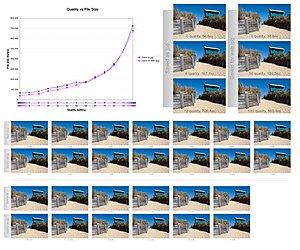
- Image via Wikipedia
The image accompanying this post is encoded with JPEG compression, a standard which, while it has been improved somewhat, has been more or less in its present form for almost two decades now. Over those two decades, images have changed their role on the web dramatically, and consequently the number and quality of images on the web have been increasing exponentially. Yet the way we make those images easy to share and transmit hasn’t caught up with the times.
Increases in bandwidth, it must be said, have made the matter one of very little urgency, and it’s important to admit that it takes less time to load a content-rich webpage (our front page averages 1-1.5MB) than it did to load a barebones page in the old days. But even so, it’s just as true that images take up the bulk of the bandwidth and making them more efficient means making the web more efficient. It looks like Google is trying to do just that with its new WebP image format.
We already have alternative image formats: specialty formats like PNG for certain types of images, and next-generation implementations of JPEG principles such as JPEG XR and JPEG 2000. Now’s not the time to discuss their strengths and shortcomings. But judicious use of such formats makes for a significantly more streamlined web experience, and misuse results in such things as ordinary images taking up many times the space they should (something I see a lot on the TechCrunch network, incidentally).
Some people consider optimization on the level of a few kilobytes here and there to be trivial, even a sort of web pedantry. But no one questioned Google’s logic when they introduced Google Instant, which rarely saves anyone more than a second, if that. The collected savings from billions of searches justifies the technology, and the same applies to images. Images are being added to the web at ever-increasing rates, and sites like Facebook and Flickr encourage you to host your images on the web instead of locally. Even a minor improvement in efficiency, to say nothing of the ~40% improvement Google is quoting, would save terabytes of bandwidth every hour.









